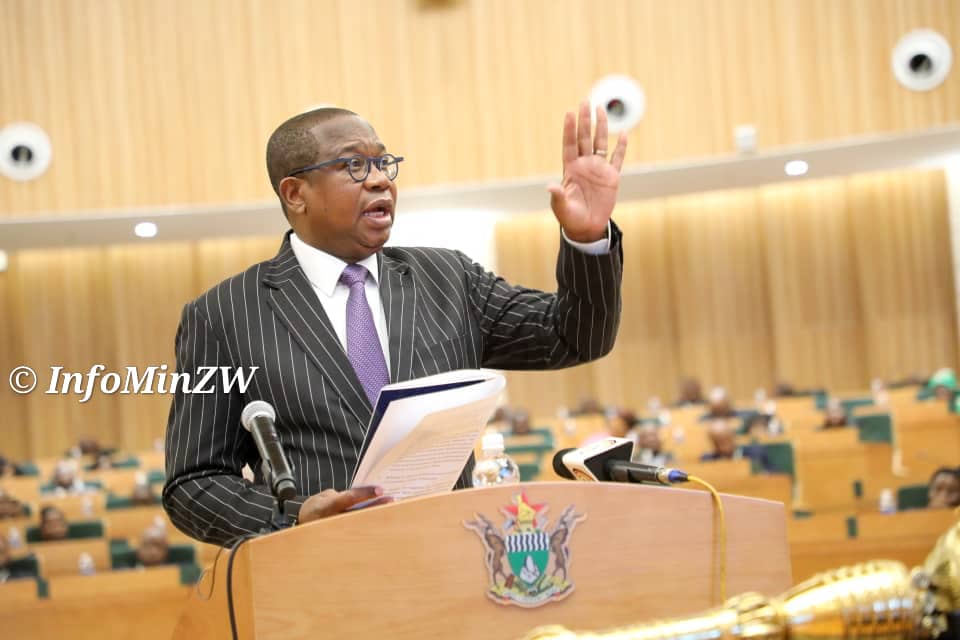Zim finance minister unveils ZWL$60 trillion 2024 national budget
Share

Harare (New Ziana) – Finance, economic development and investment promotion Minister Prof. Mthuli Ncube on Thursday presented a Z$59.5 trillion 2024 national budget, to be financed through projected tax revenue collections of Z$51.2 trillion, non-tax inflows of Z$2.7 trillion, and borrowings.
Zimbabwe’s 2023 national budget was Z$4.2 trillion.
“Mr Speaker Sir, in line with the projected economic growth of 3.5 percent, total revenue collections in 2024 are estimated at Z$53.9 trillion, (18.3% of GDP), broken down as Z$51.2 trillion tax revenue and Z$2.7 trillion non tax revenue. Guided by the expected revenue envelope and the desired fiscal path, expenditures in 2024 are projected at Z$58.2 trillion (19.8% of GDP).
“The fiscal policy thrust for the 2024 National Budget is guided by the need to maintain a sustainable budget deficit within the SADC macroeconomic convergence threshold of not more than 3 percent of GDP,” he said.
Ncube said the budget was tailored to consolidate economic growth and macro-economic stability.
“Going into 2024, the Government seeks to consolidate and entrench the stability to facilitate economic transformation and preserve disposable incomes,” he said.
“Fiscal restraint and tight monetary policy, together with a healthy current account position, provides the necessary conditions for currency and price stability,” he added.
Ncube said the 2024 budget gives priority to infrastructure spending, government wages and preserving disposable incomes.
“The total budget financing gap amounts to Z$9.2 trillion, comprising a budget deficit of Z$4.3 trillion (1.5% of GDP) and amortisation of loans and maturing Government securities estimated at Z$4.9 trillion.
“The deficit will be financed through domestic and external borrowing,” he said.
The 2024 GDP projections are underpinned by assumptions of normal to below normal rainfall season due to the El-Nino effect; slowdown in global economic growth and continued geo-political tensions; declining international commodity prices; continued use of the multi-currency regime; and tight fiscal and monetary policies.
He said during the formulation process of the 2024 budget, ministries, departments and agencies submitted funding bids of over Z$110 trillion, against the available envelope of Z$58.2 trillion.
“The envelope is limited by the sustainable revenue to GDP ratio of about 18 percent which has been allocated to MDAs (ministries, departments and agencies) as indicated,” he said.
In terms of allocations, Ncube gave the security cluster the highest budget allocation, followed by the Ministry of Primary and Secondary Education and the Ministry of Health and Childcare in line with the government’s desire to ensure universal access to education and health care.
He said security forces play an important role of protecting the country’s territorial integrity, national interest and sovereignty over land and air space, against both internal and external aggression.
Prof Ncube allocated the sector, comprising the defence forces, police, prisons and special services, Z$8.6 trillion for their remuneration, food rations, operational equipment and other requirements.
He said the budget also prioritised provision of quality and easy access to education and other learning opportunities for children, which is central to the country’s attainment of SDG 4. 85.
“In this regard, Z$8 trillion has been set aside for the Ministry of Primary and Secondary Education for teaching and learning materials, as well as teacher capacitation at primary and secondary education level. This includes resources for the procurement of sanitary wear for disadvantaged girls,” he said.
The Ministry of Agriculture got the third highest allocation.
He said the 2024 budget also sought to consolidate recovery of the public health sector across all levels of health care, through provision of the requisite tools of trade such as adequate working space, manpower, drugs and medical supplies across the value chain.
“In this regard, an amount of Z$6.3 trillion has been allocated towards the Ministry of Health and Child Care,” Prof Ncube said.
Turning to agriculture, he said in 2024, the thrust will be consolidating the gains achieved by the country in the sector, such as becoming wheat self-sufficient.
“In this regard, Z$4.3 trillion is being allocated to the Ministry of Lands, Agriculture, Fisheries, Water and Rural Development to spearhead the implementation of the Agriculture and Food Systems Transformation Strategy,” he said.
Ncube said economic growth is expected to slow down to 3.5 percent in 2024, mainly owing to the anticipated impact of the El-Nino phenomenon in the 2023/24 summer cropping season, as well as declining mineral commodity prices due to global economic slowdown.
“The domestic economy is now projected to grow by 5.5 percent in 2023, a slight upward revision from the August projection of 5.3 percent, on account of better-than-expected output in agriculture, in particular, tobacco, wheat and cotton.
“The positive growth of 3.5 percent in 2024 will be driven by mining (+7.6%) and accommodation and food services (+6.9%), while the agriculture sector is projected to contract by (-4.9%),” he said.
Ncube said in order to raise resources to finance road infrastructure, he proposed an upwards review of the Strategic Reserve Levy by US$0.03 and US$0.05 per litre of diesel and petrol, respectively, with effect from 1 January 2024.
He also increased toll Fees on premium roads, that is, Harare-Beitbridge and Plumtree-Mutare and other roads, with effect from 1 January 2024.
“Additional revenue generated from the above measures will be ring-fenced towards road infrastructure development,” he said.
He proposed that passport and selected fees charged by the Central Vehicle Registry be increased, with effect from 1 January 2024.
“Revenue derived from the increased fees will be remitted to the Consolidated Revenue Fund.
In response to the growing concerns on the adverse effects of consumption of sugar, in particular, contained in beverages, Ncube introduced a levy of US$0.02 per gram of sugar contained in beverages, excluding water, with effect from 1 January 2024.
Funds derived from this levy will be ring-fenced for therapy and procurement of cancer equipment for diagnosis, he said.
In order to ensure that every person contributes to the fiscus in line with their levels of income, Ncube proposed to introduce a Wealth Tax levied at a rate of 1 percent of market values of residential properties with a minimum value of US$100 000.
“Resources derived from the levy will be ring-fenced towards urban infrastructure development, in particular roads, water, sewer and community health centres. Principal Private Residential properties owned by elderly persons above 70 years will, however, be exempt from the tax,” he said.
He said Zimbabwe exported goods worth US$5.2bn in the first nine months of the year.
Exports are expected to end the year at US$7.3bn, up from US$7bn in 2022. This was due to higher exports of tobacco, lithium, and diamonds.
New Ziana












